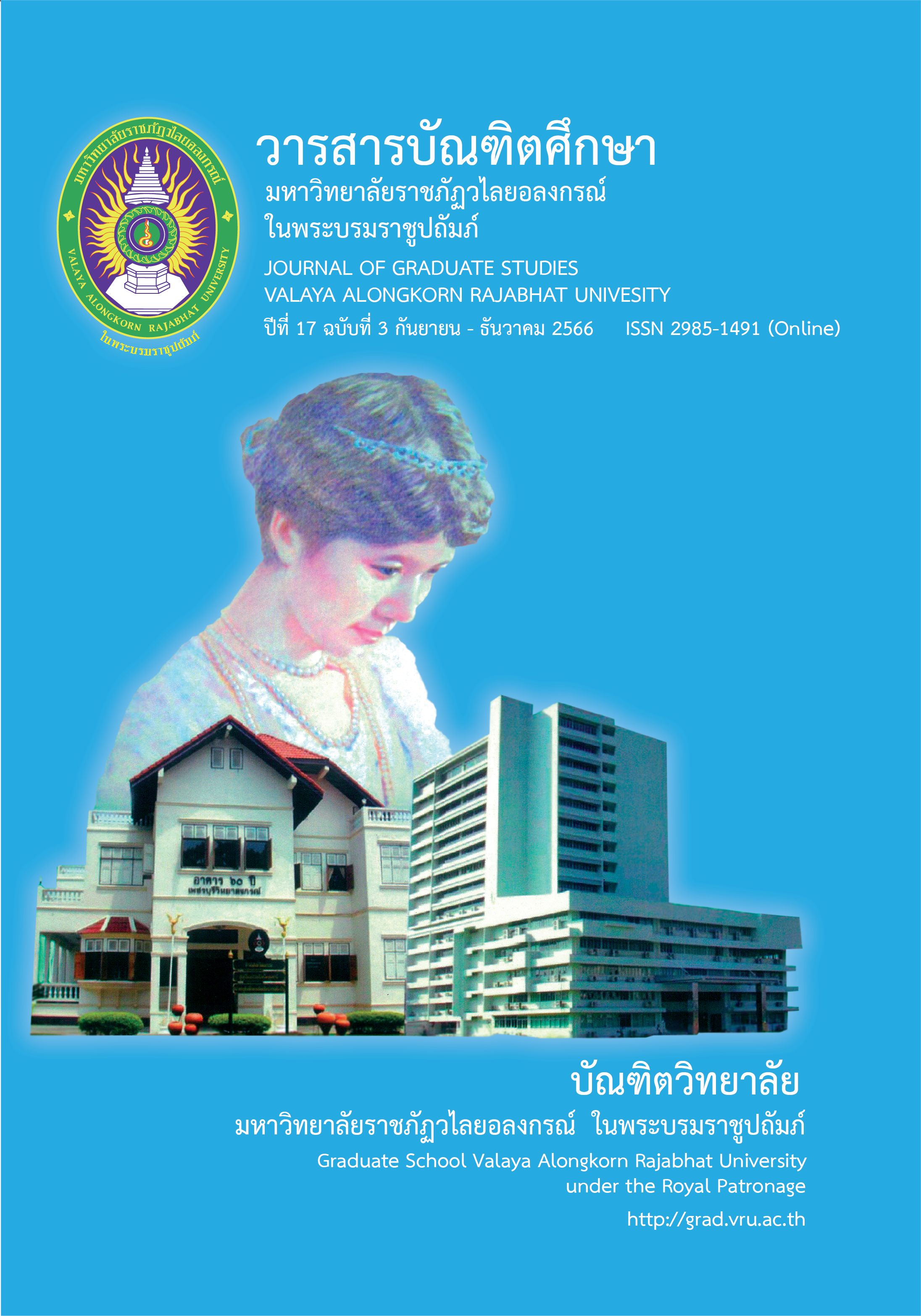DEVELOPMENT OF CULTURAL TOURISM QUALITY IN ANG THONG PROVINCE
Main Article Content
Abstract
This research aimed to study 1) the potential of cultural tourism sites in Ang thong Province, 2) the tourists’ traveling behavior to cultural tourism sites in Ang thong province, 3) the tourists’ need for cultural tourism sites in Ang thong province, and 4) the guidelines for developing cultural tourism in Ang thong province. It employed a mixed methods approach. The study included a sample of purposively selected informed persons namely government officers, monks, community leaders, entrepreneurs, and people in 5 study places, 4 persons from each making a total of 20 persons, using interview form to collect data; and a sample of 395 conveniently selected Thai tourists, using questionnaire to collect data. The data was analyzed for descriptive statistics to find frequency, percentage, mean, and standard deviation.
Results suggested the followings. 1) The potential as cultural tourism sites was at a high level in 3 aspects i.e. (1) attractiveness for tourism, (2) tourism accommodation, and (3) management. The distinctive features are historical background, culture, tradition, and development of basic facilities to accommodate tourists at present. 2) Tourists’ travelling behavior for cultural tourism revealed that most of them traveled by their own cars for a round trip of no more than 2 days, 1-2 trips per year, with 2 – 5 companions. Vacation was their main purpose. They chose to travel to historical sites, spent 5,000 Baht on average, and received tourism information from friends or relatives. 3) The tourists’ need for cultural tourism was at a high level in overall, ranked by the level of need in different aspects as follow: staff and service process, tourism resources, tourism marketing, and tourism activities, respectively. And 4)guidelines for developing cultural tourism in Ang thong province comprise 7 approaches namely (1) developing collaborative networks among involved organizations and groups; (2) developing tourism resources and convenient accessibility to tourism sites, and laying down tourism routes to link with nearby tourism sites; (3) Developing the activities management in tourism sites and arrangement of diverse cultural activities; (4) developing the management to educate community and build their consciousness;
(5) developing staff and service process; (6) developing tourism marketing and promoting tourism through public relations of tourism sites; and (7) developing the management to monitor and evaluate changes caused by tourism.
Article Details

This work is licensed under a Creative Commons Attribution-NonCommercial-NoDerivatives 4.0 International License.
บทความทุกเรื่องได้รับการตรวจความถูกต้องทางวิชาการโดยผู้ทรงคุณวุฒิ ทรรศนะและข้อคิดเห็นในบทความ Journal of Global of Perspectives in Humanities and Social Sciences (J-GPHSS) มิใช่เป็นทรรศนะและความคิดของผู้จัดทำจึงมิใช่ความรับผิดชอบของบัณฑิตวิทยาลัย มหาวิทยาลัยราชภัฏวไลยอลงกรณ์ ในพระบรมราชูปถัมภ์ กองบรรณาธิการไม่สงวนสิทธิ์การคัดลอก แต่ให้อ้างอิงแหล่งที่มา
References
Chittangwattana, B. (2005). kānphatthanā kānthō̜ngthīeo yāng yangyư̄n [Sustainable tourism development]. Bangkok: Authority of Thailand Academic.
Coolican, H. (2004). Research methods and statistics in psychology. Hodder Education.
Department Ang thong Province. (2017). phǣn phatthanā čhangwat ʻĀng Thong Phō̜.Sō̜. sō̜ngphanhārō̜ihoksipʻet - sō̜ngphanhārō̜ihoksiphā [Ang Thong Province Development Plan 2018 – 2022]. Ang thong: Strategic and Information Work Group for Provincial Development.
Department of Tourism. (2014). khūmư̄ trūat pramœ̄n māttrathān khunnaphāp lǣng thō̜ngthīeo chœ̄ng watthanatham [Thailand Tourism Standard Audit Guide]. Bangkok: Office of Printing works The War Veterans Organization of ThailandUnder Royal Patronage of His majesty the King.
Kanchula, C. (2020). patčhai thī mī ʻitthiphon tō̜ kāntatsinčhai thō̜ngthīeo mư̄ang rō̜ng khō̜ng nakthō̜ngthīeo chāo Thai kō̜ranī sưksā čhangwat ʻĀng Thong [Factors Affecting the Decision to Travel to Secondary Cities of Thai Tourists. A Case Study of Ang Thong province]. Journal of Sustainable Tourism Development. 2(2), 64.
Krejcie, R. V. & Morgan, D. W. (1970). Determining Sample Size for Research Activities. Educational and Psychological Measurement. 30, 607-610.
Noppawan, W., Nongyao, U., Choochat, P. & Theeraphong, B. (2017). sakkayaphāp nai kān pen lǣng thō̜ngthīeo chœ̄ng phut khō̜ngwat nai čhangwat Pathum Thānī [The potential of buddhist tourism destination: Temples in Pathum Thani province]. Journal of Graduate Studies Valaya Alongkorn Rajabhat University. 14(1), 97 - 107.
Parliamentary Budget Office. (2022). khō̜sanœ̄ nǣothāng kān songsœ̄m thō̜ngthīeo mư̄ang rō̜ng phư̄a kračhāi rāidai čhāk kānthō̜ngthīeo [Proposal for promoting tourism in secondary cities to spread Income from tourism]. Bangkok: Office of the Secretariat of the House of Representatives.
Ratanasuwongchai, N. (2011). konlayut kānphatthanā kān thō̜ng thō̜ngthīeo chœ̄ng watthanatham [Cultural Tourism Development Strategies]. Manutsayarsat Wichakan Journal. 18(1), 31-53.
Rovinelli, R. J. & Hambletion, R. K. (1977). On the use of content specialists in the assessment of criterion referenced test item validity. Dutch Journal of Educational Research. 2(2), 49 – 60.
Sawangpanapan, K. (2012). sakkayaphāp kānthō̜ngthīeo yāng yangyư̄n khō̜ng chumchon tān tanōt: kō̜ranī sưksā chumchon tān tanōt tambon tham rong ʻamphœ̄ bān lāt čhangwat phētchaburī [Sustainable tourism potential of the Tan Tanod: a case study of Tan Tanod community, Tham Rong sub district, Ban Lat district, Phetchaburi province]. Graduate School, Silpakorn University Phetchabury.
Somjai, U. & Na Lamphoon, P. (2020). phrưttikam læ khwāmtō̜ngkān khō̜ng nakthō̜ngthīeo thī mī tō̜ kānthō̜ngthīeo chœ̄ng watthanatham tambon bāng chō long ʻamphœ̄ bāng phlī čhangwat Samut Prākān [Behaviors and Needs of Tourists Toword Cultural Tourism in Bangchalong Sub – District Bangpli District]. Samutphakarn. Liberal Arts Review. 15(2), 13-27.
Srisa-ard, B. (2002). kānwičhai bư̄angton [Basic research]. 7th ed. Bangkok: Suweeriyasan.
Sukhanthasirikun, G. (2012). kānphatthanā khunnaphāp kānthō̜ngthīeo chœ̄ng watthanatham nai phāk tawanʻō̜k chīang nư̄a [The Quality Development of Cultural Tourism in North Eastern]. Nakhon Ratchasima: Suranaree University of Technology.


